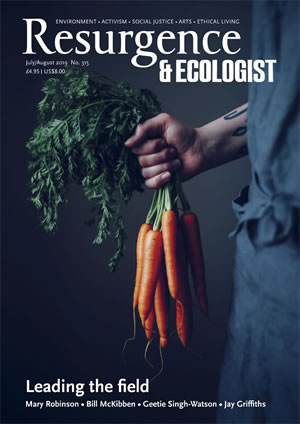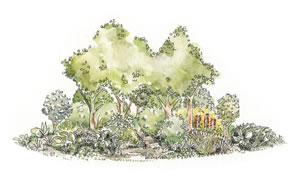Down on the farm, a new grassroots initiative is being sown: a simple idea for turning plots of land into sustainable and self-regulating ecosystems that can provide nutritious, healthy, organic food for local communities and also bring those communities together to combat loneliness and engender a sense of comradeship and belonging. And it’s working.
The Food Forest Project is a small, newly formed organisation that has been established to help communities to plant food forests. But it’s not just about growing food for the local community. It’s also about providing food and habitats for wildlife – so it’s a win–win situation for all.
The idea was conceived by Bristol-based Tristan Faith, a specialist in architectural conservation, who shared his vision with me by sketching the concept on paper. “It’s the idea of working with Nature to replenish itself naturally rather than over-working and depleting the soil,” he explained. “It’s all about creating a layered, self-regulating ecosystem. It starts with planting trees that grow to create a canopy layer that shades a mid-layer of fruit trees that in turn shade a shrub layer and a root crop layer, right down into the subsoil. Each layer creates a habitat for different species that enable natural predators to control the insects. It takes around five years for the complete system to stabilise and produce fruits, nuts, vegetables, herbs, and so on. Once it gets to that level of maturity no further intervention is necessary, because it then becomes self-sustaining.”
Faith’s vision remained a conceptual idea until he found a supportive farmer who kindly donated a suitable plot of land that met the criteria for the project. The land, near Shepton Mallet in Somerset, had been heavily used as pasture for many years. Now the food forest being developed there is creating an organic, biodiverse area of natural habitat that will provide perfect homes for local wildlife. The food forest also helps mitigate the effects of climate change, air pollution and the toxification of soil and water by creating natural spaces that capture carbon, regenerate soil and reduce run-off as well as stabilising erosion through the planting of woodland. No pesticides or fertilisers are necessary once the natural seasonal cycles take over, and the enriched soil will enable organic fruits and vegetables to thrive. These products will then be available for the local community to buy by donation, helping to fund further expansion.
Creating a food forest requires a lot of careful planning if it is to thrive in a self-sustaining manner. Current food-production techniques tend to create huge wastage as well as depleting soil nutrients, so the project focuses on minimising wastage by means of a ‘closed loop’ system. It has been calculated that a large quantity of high-quality and totally organic food can be produced in a small area with minimum wastage. Any excess products can be recycled naturally to further enrich the soil.
The project has another important goal. A large proportion of modern society has lost its connection to the natural environment. In recognition of this, the project has now joined forces with SAFE Collective, an organisation that works with vulnerable and abused young people. Volunteers bring teenagers to the Shepton Mallet site to plant trees and crops and to learn all about sustainable agriculture and food production in a safe, inspiring and natural environment. Introducing vulnerable young people to these and similar activities helps build their self-confidence and shows how they have value in the community.
For more information: www.thefoodforestproject.org







